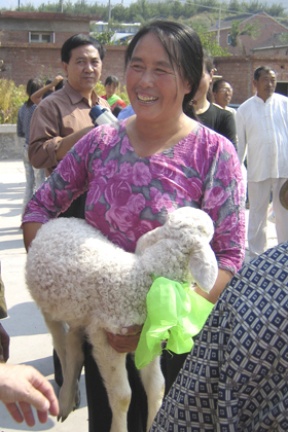A congregation raises funds to send livestock to villages in need.
The fortunes of a Chinese village multiplied like rabbits when poor, young peasant Ren Xuping got 20 hares from Heifer International in 1985.
In 20 years, Ren passed on more than 5,000 rabbits to his neighbors, helping them get out of poverty and into business. Today he runs a training school in rabbit husbandry as well as a meat processing plant, which buys meat from the villagers when they can’t find a market.
“He really took these rabbits and ran,†said Glenna Teti, who visited the village outside Cheng Du in Sichuan Province.
Teti, a deacon at Rolling Bay Presbyterian Church, and her congregation have adopted Heifer International as its project for the year as a result of Teti’s study tour with the nonprofit Heifer International in September.
The church is having a fund-raising drive to collect $5,000, through the church, by Oct. 30. If they are successful, an anonymous donor has agreed to match it with $5,000.
The money will be enough to “fill an ark†– to buy two of every animal that Heifer International uses to break the cycle of poverty worldwide. Heifer provides livestock and training in more than 125 countries.
The goal is to make people self-sustaining, but also able to pass on the gift of livestock and training to another needy family in their village, thus also strengthening community bonds.
The organization is also active in the U.S. and is now working to restart 24 programs that were wiped out by Hurricane Katrina.
“There are places where for the price of a goat, a family can go from borderline starvation to self-sufficiency forever,†Teti said. “You’re not giving them fish, but a fishing pole.â€
On her recent tour of China through Beijing, Chengdu, Dayi, Nanbu, Songpan and Hong Kong, Teti observed how Heifer works.
The organization assesses a village’s needs and selects appropriate animals from its “stock†of 26 animals – from earthworms to goats, cows and yaks.
The village decides which families will receive the initial distribution and livestock management training. Training by local Heifer representatives also educates people on how to improve the natural environment.
Teti recalls one village where Heifer showed how rather than allow goats to overgraze the limited grass, fodder – straw leftover from the grain crop – could be fed to the animals, whose manure was then collected to make methane gas for heat and light and whose milk was a source of protein and a cash crop.
“I like a project that changes people’s lives for the good,†Teti said. “Heifer makes people part of the training and then the recipient can be the donor, and it changes feelings of self-respect.
“What I saw was how happy the people are with Heifer International and how they revere (the organization). People told me ‘Our whole village is different!’â€
Teti described Ren, dubbed “the rabbit king†by his village neighbors, as grateful to Heifer and enthusiastic about being able to help his community.
“It’s a positive thing because they develop the future instead of healing the immediate situation,†Teti said.
* * * * *
Fill an ark
Rolling Bay Presbyterian Church’s fund-raising drive to raise $5,000 for Heifer International by Oct. 30 will be matched by an anonymous donor if the amount is reached through the church’s collection. Make contributions payable to “Heifer International†and leave them in the collection box in the church lobby or mail to Rolling Bay Presbyterian Church, P.O. Box 131, Rollingbay, WA 98061. For more information, contact Glenna Teti, 842-9293 or glennateti@mac.com.



